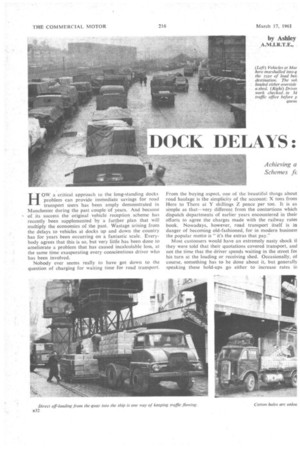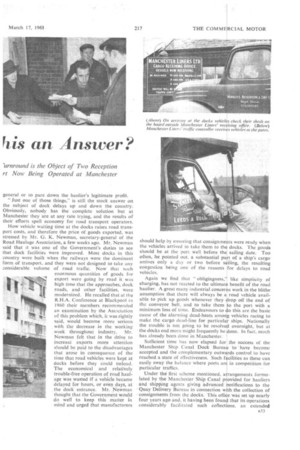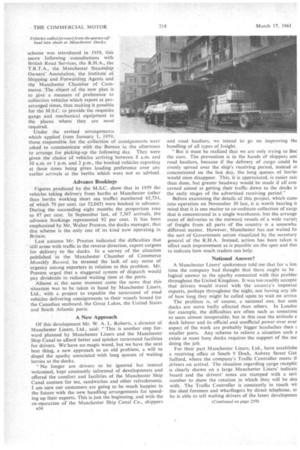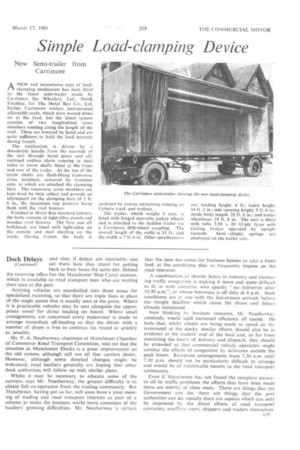DOCK DELAYS:
Page 66

Page 67

Page 68

Page 71

If you've noticed an error in this article please click here to report it so we can fix it.
ftis an Answer?
Achieving a Schemes ft -urnround is the Object of Two Reception rt Now Being Operated at Manchester . H . OW a critical, approach to the long-standing docks problem can provide immediate savings for road transport users has been amply demonstrated in Manchester during the past couple of years. And because • of its success the original vehicle reception scheme has recently been supplemented by a further plan that will multiply the economies of the past. Wastage arising from the delays to vehicles at docks up and down the country has for years been occurring on a fantastic scale. Everybody agrees that this is so, but very little has been done to ameliorate a problem that has caused incalculable loss, at the same time exasperating every conscientious driver who has been involved.
Nobody ever seems really to have got down to the question of charging for waiting time for road transport. From the buying aspect, one of the beautiful things about road haulage is the simplicity of the account: X tons from Here to There at Y shillings Z pence per ton. It is as simple as that—very different from the contortions which dispatch departments of earlier years encountered in their efforts to agree the charges made with the railway rates book. Nowadays, however, road transport itself is in danger of becoming old-fashioned, for in modern business the popular motto is "it's the extras that pay."
Most customers would have an extremely nasty shock if they were told that their quotations covered transport, and not the time that the driver spends waiting in the street for his turn at the loading or receiving shed. Occasionally, of course, something has to be done about it, but generally speaking these hold-ups go either to increase rates in general or to pare down the haulier's legitimate profit.
"Just one of those things," is still the stock answer on the subject of dock delays up and down the country. Obviously, nobody has the complete solution but at Manchester they are at any rate trying, and the results of their efforts spell economy for road transport operators.
How vehicle waiting time at the docks raises road transport costs, and therefore the price of goods exported, was stressed by Mr. G. K. Newman, secretary-general of the Road Haulage Association, a few weeks ago. Mr. Newman said that it was one of the Government's duties to see that dock facilities were improved. Most docks in this country were built when the railways were the dominant form of transport, and they were not designed to take any considerable volume of road traffic. Now that such enormous quantities of goods for export were going by road it was high time that the approaches, dock roads, and other facilities, were modernized. He recalled that at the R.H.A. Conference at Blackpool in 1960 their members recommended an examination by the Association of this problem which, it was rightly said, v;/ould become more serious with the decrease in the working week throughout industry. .Mr. Newman felt that in the drive to increase exports more attention should be paid to the disadvantages that arose in consequence of the time that road vehicles were kept at docks before they could unload. The economical and relatively trouble-free operation of road haulage was wasted if a vehicle became delayed-for hours, or even days, at the dock entrance. Mr. Newman thought that the Government would do well to keep this matter in mind and urged that manufacturers
should help by ensuring that consignments were ready when the vehicles arrived to take them to the docks. The goods should be at the port well before the sailing date. Too often, he pointed out, a substantial part of a ship's cargo arrives only a day or two before sailing, the resulting congestion being one of the reasons for delays to road vehicles.
Again we find that "obligingness," like simplicity of charging, has not reacted to the ultimate benefit of the road haulier. A great many industrial concerns work in the blithe assumption that there will always be a road vehicle available to pick up goods whenever they drop -off' the end of the conveyor belt, and to take them to the. port with a minimum loss of time. Endeavours-to do this are the basic cause of the alarming dead-heats amprt vehicles racing to make the cargo dead-line for particula ships. Nationally the trouble is not going to be resolved overnight, but at the docks end more might frequently be done. In fact, much has already been done in Manchester.
Sufficient time has now elapsed for the success of the 'Manchester Ship Canal DOck 'Bureau to have become accepted and the complementary outwards control to have reached a state of effectiveness. Such facilities as these can easily sway the balance where ports ar ' Competition for particular traffics. •
Under* the first scheme mentioned. a rangements formulatedby 'the Manchester Ship Canal' povided for hauliers and shippingagents giving advanced'hot ifications to the Quay Delivery Bureau in connection with the collection of 'consignments from the docks.' This office was set up nearly four years ago and, it having been' found that its operations considerably facilitated such collections, an extended
scheme was introduced in 1959, this move following consultations with British Road Services, the R.H.A., the T.R.T.A., the Manchester Steamship Owners' Association, the Institute of Shipping and Forwarding Agents and the Manchester Chamber of Commerce. The object of the new plan is to give a measure of preference to collection vehicles which report at prearranged times, thus making it possible for the M.S.C. to provide the requisite gangs and mechanical equipment in the places where they are most required.
Under the revised arrangements which applied from January 1, 1959, those responsible for the collection of consignments were asked to communicate with the Bureau in the afternoon to arrange for picking-up the following day. They were given the choice of vehicles arriving between 8 a.m. and 10 a.m. or 1 p.m. and 2 p.m., the booked vehicles reporting at these times being given loading preference over any earlier arrivals at the berths which were not so advised.
Advance Bookings Figures produced by the M.S.C. show that in 1959 the vehicles taking delivery from berths at Manchester (other than berths working short sea traffic) numbered 65,754, of which 79 per cent. (or 52,045) were booked in advance. During the succeeding eight months the proportion rose to 87 per cent. In September last, of 7,367 arrivals, the advance .bookings represented 92 per cent. It has been emphasized by Mr. Walter Preston, the docks manager, that this scheme is the only one of its kind now operating in Britain.
Last autumn Mr. Preston indicated the difficulties that still arose with traffic in the reverse direction, export cargoes for delivery to the docks. In a survey of the situation published in the Manchester Chamber of Commerce Monthly Record, he stressed the lack of any sense of urgency among exporters in relation to this problem. Mr. Preston urged that a staggered system of dispatch would pay dividends in reduced waiting time at the ports.
Alinost at the same moment came the news that this situation was to be taken in hand by Manchester Liners, Ltd., with a project to expedite the turnround of road vehicles delivering consignments to their vessels bound for the Canadian seaboard, the Great Lakes, the United States and South Atlantic ports.
A New Approach Of this development Mr. W. A. L. Roberts, a director of Manchester Liners, Ltd., said: "This is another step forward planned by Manchester Liners and the Manchester Ship Canal to afford better and quicker turnround facilities for drivers. We have no magic wand, but we have the next best thing, a new approach to an old problem, a will to dispel the apathy associated with long queues of waiting lorries at the docks.
"No longer are drivers to be ignored but instead welcomed, kept constantly informed of developments and offered the comfort and facilities of the Manchester Ship Canal canteen for tea, sandwiches and other refreshments. I am sure our customers are going to be much happier in the future with the new handling arrangements for speeding up their exports. This is just the beginning, and with the co-operation of the Manchester Ship Canal Co., shippers B34 and road hauliers, we intend to go on improving the handling of all types of freight.
But it must be realized that we are only trying to find the cure. The prevention is in the hands of shippers and road hauliers, because if the delivery of cargo could be evenly spread over the ship's receiving period, instead oi concentrated on the last day, the long queues of lorrief would soon disappear. This, it is appreciated, is easier saic than done, but greater headway would be made if all con. cerned aimed at getting their traffic down to the docks ir the early stages of the advertised receiving period."
Before examining the details of this project, which cam( into operation on November 30 last, it is worth bearing it mind that it is one matter to co-ordinate collection of carg( that is concentrated in a single warehouse, but the arrange ment of deliveries to the outward vessels of a wide variet3 of freight from all parts of the country is a somewha different matter. However, Manchester has not waited fo
• the sort of Government action visualized by the secretary general of the R.H.A. Instead, action has been taken t( effect such improvement as is possible on the spot and thei to indicate how much traders can help.
National Answer?
A Manchester Liners' spokesman told me that for a lon, time the company had thought that there ought to be logical answer to the apathy connected with this problen throughout the United Kingdom. It was too readily accepte that drivers would travel with the country's importan exports, perhaps throughout the night, not having any ide of how long they might be called upon to wait on arriva The problem is, of course, a national one, but som docks are more badly affected than others. In Londor for example, the difficulties are often such as sometime to seem almost insuperable; but in this case the attitude dock labour and its official and unofficial power over ever aspect of the work are probably bigger headaches than 2 smaller ports. Any scheme to relieve a situation such a exists at most busy docks requires the support of the me doing the job.
For their part Manchester Liners, Ltd., have establishe a receiving office at South 9 Dock, Aubrey Street Gat, Salford, where the company's Traffic Controller meets tt drivers on arrival. The situation regarding cargo receptio is clearly shown on a large Manchester Liners' indicatc board and the drivers' notes are stamped with a seri: number to show the rotation in which they will be dea with. The Traffic Controller is constantly in touch wil the shed foremen and wharfingers by direct telephone, ar he is able to tell waiting drivers of the latest developmen
and also, if delays are inevitable, can
(Continued) tell them how they stand for getting back to their bases the same day. Behind the receiving office lies the Manchester Ship Canal canteen, which is available to road transport men who are waiting their turn at the port.
Arriving vehicles are marshalled into three areas for specialized receiving, so that .there are triple lines in place of the single queue that is usually seen at the ports. Where it is practicable vehicles may be sent alongside the appropriate vessel for direct loading on board. Where small consignments are concerned every endeavour is made to arrange immediate off-loading so that the driver with a number of drops is free to continue his round as quickly as possible.
Mr. V. A. Neatherway, chairman of Manchester Chamber of Commerce Road Transport Committee, told me that the situation at Manchester Docks is a great improvement on the old system, although still not all that carriers desire. However, although some detailed changes might be welcomed, road hauliers generally are hoping that other dock authorities will follow up with similar plans.
Whilst it may be necessary to educate some of the carriers, says Mr. Neatherway, the greater difficulty is to obtain full co-operation from the trading community. But Manchester, having got so far, will soon have a joint meeting of trading and road transport interests as part of a scheme to make the business world more conscious of the hauliers' .growing difficulties. Mr. Neatherway is certain that the time has come for business houses to take a fresh look at the conditions they so frequently impose on the road operator.
A combination of shorter hours in industry and increasing traffic congestion is making it more and more difficult to lit in with concerns who specify "no deliveries after 10.30 a.m."; or whose hoistman is off duty at 4 p.m. Such conditions are at one with the last-minute arrivals before the freight deadline which cause the chaos and delays already mentioned.
New thinking by business concerns, Mr. Neatherwa contends, would spell increased ellkiency all round. He feels that, whilst efforts are being made to speed un the turnround at the docks, similar efforts should also be in evidence at the traders' end of the haul and, so far from restricting the hours of delivery and dispatch, they should be extended so that commercial vehicle operators might combat the effects of congestion by deliveries outside the peak hours. Reception arrangements from 7.30 a.m. until 7.30 p.m. should not be particularly difficult to arrange and would be of inestimable benefit to the road transport community.
Even if Manchester has not found the complete answer to all its traffic problems the efforts that have been made there are worthy of close study. There are things that the Government can do, there are things that the port authorities can do, equally there are aspects which can only be improved by the direct efforts of road transport operators, ancillary users, shippers and traders themselves.




































































































































